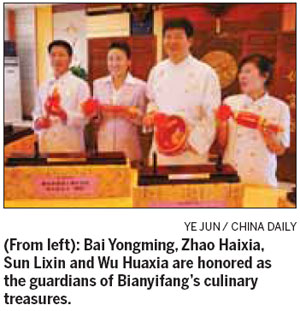Roast duck renaissance
Updated: 2012-07-02 10:01
By Ye Jun (China Daily)
|
|||||||||||
 |
"It was typical to think 'we are the big brothers' and disregard customers' needs," he says. "The most difficult part was not preserving cooking techniques but, rather, shifting conceptions."
He worked hard to bring in new talent, such as chefs who had worked in big hotels, while he introduced innovative dishes and improved service standards.
Sun has a broad spectrum of culinary influences. He studied under a Sichuan cuisine master in his early days but later also learned Cantonese, Zhejiang, Shandong, Hunan and Beijing cooking.
His knowledge of Cantonese cuisine, with its beautiful presentation and healthy concepts, is a basis for his innovation.
The rest of his inspiration comes from combining traditional cooking techniques with modern ingredients and presentation.
His efforts have paid off, and Bianyifang is again enjoying an excellent reputation.
It now has 17 branches in Beijing and closed-oven roasting has been adopted by some high-end hotels because it is healthier.
Sun says that although they source the same ducks as Quanjude, theirs are produced at a higher cost and sold for less.
"Many dishes are popular only for a period of time. But Peking roast duck is an all-time dish representative of China," Sun says.
"I hope my 'vegetable aroma duck', with its healthy concept, can be passed on to future generations.
"What the diners want is something practical and realistic. Techniques such as molecular gastronomy can only be used for special effects."
Sun is from the first batch of national-level cuisine masters named in 1999 and was awarded among the Top 10 Chinese Chefs by the Ministry of Commerce in 2006.
Early in June, Beijing Bianyifang Roast Duck Group celebrated the 10th anniversary of its founding and the 596th anniversary of the brand name.
To celebrate the occasion, the group honored four chefs as the guardians of its culinary treasures.
As executive chef, Sun Lixin was given a "frying pan and frying ladle" made of cloisonne.
Chef Bai Yongming, closed-oven roast duck specialist, was given a "roast duck pole".
Shaomai (steamed pork dumpling) specialist Wu Huaxia received a shaomai making zouchui (a rolling pin).
Traditional pastry master Zhao Haixia also received a rolling pin.
Bianyifang's closed-oven roast duck technique, as well as the shaomai making skills of its sister restaurant Du Yi Chu, are recognized as China's national cultural intangible heritage.
Related Stories
Duck soup 2012-06-28 09:20
Sautéed Chinese cabbage with duck 2012-06-28 09:03
Bianyifang roast duck 2012-02-22 10:59
Twice-cooked duck with pea shoots 2012-05-17 10:10
Yunnan stakes its claim to best duck 2012-03-04 17:06
Today's Top News
Rescuers race against time for quake victims
Telecom workers restore links
Coal mine blast kills 18 in Jilin
Intl scholarship puts China on the map
More bird flu patients discharged
Gold loses sheen, but still a safe bet
US 'turns blind eye to human rights'
Telecom workers restore links
Hot Topics
Lunar probe , China growth forecasts, Emission rules get tougher, China seen through 'colored lens', International board,
Editor's Picks

|

|

|

|

|

|





